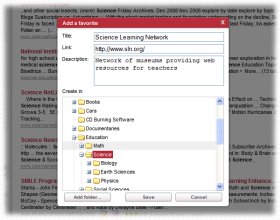|
Education
Web
Viewing 1-3 of 3 total results
Biological Literacy, Colorado Springs, 1993. Bourque, M.L., Champagne, A.B., Crissman, S., 1996 Science Performance Standards: Achievement Results for the Nation and the States, Washington, D.C., National Assessment Governing Board, 1997. Bruer, J. T., "Education and the Br...
1
0
Biological Literacy, Colorado Springs, 1993. Bourque, M.L., Champagne, A.B., Crissman, S., 1996 Science Performance Standards: Achievement Results for the Nation and the States, Washington, D.C., National Assessment Governing Board, 1997. Bruer, J. T., "Education and the Brain: A Bridge Too Far," Educational Researcher. Burke, James, Connections, Boston, Toronto, Little, Brown and Company, 1978. Bybee, R. & DeBoer, George E. "Research on Goals for the Science Curriculum," Handbook of Research on
69
0
http://www.dpi.state.nc.us/docs/curriculum/science/scos/2004/science.pdf#page=69
www.dpi.state.nc.us/docs/curriculum/science/scos/2004/science.pdf#page=69
• The uniqueness <span class="highlight">of</span> Earth. 5.06 Analyze the spin-off benefits generated by space exploration technology including: • <span class="highlight">Medical</span>. • Materials. • Transportation. • Processes. • Future <span class="highlight">research</span>
152
0
http://www.dpi.state.nc.us/docs/curriculum/science/scos/2004/science.pdf#page=152
www.dpi.state.nc.us/docs/curriculum/science/scos/2004/science.pdf#page=15...
Revised 2004 AP Science Course148 4.08 Examine current nucleic acid technology <span class="highlight">and</span> its applications. • Analyze recombinant technology. • Examine practical applications in medicine, forensics, agriculture, <span class="highlight">and</span> environmental issues. • Assess legal <span class="highlight">and</span> ethical issues that may arise. • Recommended Laboratory – Molecular Biology 4.09 Examine past <span class="highlight">and</span> present <span class="highlight">research</span> on heredity <span class="highlight">and</span> molecular genetics. • Explore the work <span class="highlight">of</span> Mendel. • Explore the work <span class="highlight">of</span> Watson <span class="highlight">and</span> Crick. Competency Goal 5: The learner will
176
0
http://www.dpi.state.nc.us/docs/curriculum/science/scos/2004/science.pdf#page=176
www.dpi.state.nc.us/docs/curriculum/science/scos/2004/science.pdf#page=17...
<span class="highlight">Biological</span> Literacy, Colorado Springs, 1993. Bourque, M.L., Champagne, A.B., Crissman, S., 1996 Science Performance Standards: Achievement Results for the Nation <span class="highlight">and</span> the States, Washington, D.C., National Assessment Governing Board, 1997. Bruer, J. T., "Education <span class="highlight">and</span> the Brain: A Bridge Too Far," Educational Researcher. Burke, James, Connections, Boston, Toronto, Little, Brown <span class="highlight">and</span> Company, 1978. Bybee, R. & DeBoer, George E. "<span class="highlight">Research</span> on Goals for the Science Curriculum," Handbook <span class="highlight">of</span> <span class="highlight">Research</span> on
177
0
http://www.dpi.state.nc.us/docs/curriculum/science/scos/2004/science.pdf#page=177
www.dpi.state.nc.us/docs/curriculum/science/scos/2004/science.pdf#page=17...
Advancing Excellence in Technological Literacy; Student Assessment, Professional Development, <span class="highlight">and</span> Program Standards, Reston, VA, ITEA, 2003 Karplus, R., "Science Teaching <span class="highlight">and</span> the Development <span class="highlight">of</span> Reasoning," <span class="highlight">Journal</span> <span class="highlight">of</span> <span class="highlight">Research</span> in Science Teaching, John Wiley & Sons, Inc., vol. 14, no.2, p. 169 - 175, 1977. Kyle, William C. Jr. (ed.), <span class="highlight">Journal</span> <span class="highlight">of</span> <span class="highlight">Research</span> in Science Teaching, New York, John Wiley & Sons, Inc., 1996. Lowery, Lawrence F. (ed.), NSTA Pathways To the Science Standards, Elem. School Ed
information from a variety of sources, use information as they make decisions and evaluations, and solve problems. The study of psychology enables students to recognize and cope with uncertainty and ambiguity in human behavior. Strands: Research Me...
1
0
information from a variety of sources, use information as they make decisions and evaluations, and solve problems. The study of psychology enables students to recognize and cope with uncertainty and ambiguity in human behavior. Strands: Research Methods, Cognitive Domain, Lifespan Development, Biopsychological Dimensions, Sociocultural Dimensions COMPETENCY GOAL 1: The learner will become familiar with the history and research methods of psychology. Objectives 1.01 Discuss the contemporary
101
0
http://www.dpi.state.nc.us/docs/curriculum/socialstudies/scos/socialstudies.pdf#page=101
www.dpi.state.nc.us/docs/curriculum/socialstudies/scos/socialstudies.pdf#...
information from a variety <span class="highlight">of</span> sources, use information as they make decisions <span class="highlight">and</span> evaluations, <span class="highlight">and</span> solve problems. The study <span class="highlight">of</span> psychology enables students to recognize <span class="highlight">and</span> cope with uncertainty <span class="highlight">and</span> ambiguity in human behavior. Strands: <span class="highlight">Research</span> Methods, Cognitive Domain, Lifespan Development, Biopsychological Dimensions, Sociocultural Dimensions COMPETENCY GOAL 1: The learner will become familiar with the history <span class="highlight">and</span> <span class="highlight">research</span> methods <span class="highlight">of</span> psychology. Objectives 1.01 Discuss the contemporary
argumentative and literary purposes, although emphasis will be placed on explanatory contexts. In addition to literature study, students will: • Examine non-literary texts related to cultural studies. • Research material to use primarily in clarifying their own explanatory re...
1
0
argumentative and literary purposes, although emphasis will be placed on explanatory contexts. In addition to literature study, students will: • Examine non-literary texts related to cultural studies. • Research material to use primarily in clarifying their own explanatory responses to situations and literary-based issues. • Critically interpret and evaluate experiences, literature, language, and ideas. • Use standard grammatical conventions and select features of language appropriate to purpose, audience, and context
122
0
http://www.dpi.state.nc.us/docs/curriculum/languagearts/scos/2004/elacurriculumall.pdf#page=122
www.dpi.state.nc.us/docs/curriculum/languagearts/scos/2004/elacurriculuma...
argumentative <span class="highlight">and</span> literary purposes, although emphasis will be placed on explanatory contexts. In addition to literature study, students will: • Examine non-literary texts related to cultural studies. • <span class="highlight">Research</span> material to use primarily in clarifying their own explanatory responses to situations <span class="highlight">and</span> literary-based issues. • Critically interpret <span class="highlight">and</span> evaluate experiences, literature, language, <span class="highlight">and</span> ideas. • Use standard grammatical conventions <span class="highlight">and</span> select features <span class="highlight">of</span> language appropriate to purpose, audience, <span class="highlight">and</span> context
180
0
http://www.dpi.state.nc.us/docs/curriculum/languagearts/scos/2004/elacurriculumall.pdf#page=180
www.dpi.state.nc.us/docs/curriculum/languagearts/scos/2004/elacurriculuma...
Heinemann. Composition in the English language arts curriculum K-12. (1989). Albany, NY: The State Education Department. Crowder, R. <span class="highlight">and</span> Crowder, R. (1992). The psychology <span class="highlight">of</span> reading: An introduction, second edition. NY: Oxford University Press. Cunningham, P. (1995). Phonics they use: Words for reading <span class="highlight">and</span> writing. New York, NY: Harper Collins. Diamond, L. <span class="highlight">and</span> Mandel, S. (1996). Building a powerful reading program: From <span class="highlight">research</span> to prac- tice. Sacramento, CA: California State University Institute <span class="highlight">of</span> Education
|
